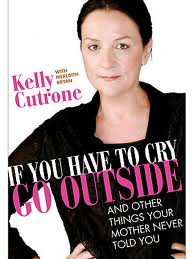Business Lessons Learned from Kelly Cutrone
 Before I read Kelly Cutrone’s New York Times best seller, “If You Have to Cry Go Outside: And Other Things Your Mother Never Told You,” I caught a few episodes of her reality show, “Kell on Earth” documenting her fashion PR firm, People’s Revolution. While I wasn’t completely impressed with the operation as documented on the show, it piqued my curiosity and made me want to learn more about the PR icon and her road to success.
Before I read Kelly Cutrone’s New York Times best seller, “If You Have to Cry Go Outside: And Other Things Your Mother Never Told You,” I caught a few episodes of her reality show, “Kell on Earth” documenting her fashion PR firm, People’s Revolution. While I wasn’t completely impressed with the operation as documented on the show, it piqued my curiosity and made me want to learn more about the PR icon and her road to success.
After reading the book, I have a lot more respect for what she’s been able to build at People’s Revolution, given her early struggles with both her personal life and her career. In my opinion, Kelly’s most important lessons aren’t just about PR – they are about life and what we expect our lives to be. She talks a lot about discovering yourself and having a chance to transform your ideals time and time again, before you can become successful.
There are some valuable business lessons here we can all learn from, no matter which end of the PR spectrum, industry or stage of your career.
- Awaken your soul: You shouldn’t expect that if you do everything your parents/the media/your friends tell you to do you will be happy. You have to listen to your inner voice and find out your own desires within your soul; without any outside expectations for who you should be and what should make you happiest in life.
- Life is unpredictable: You need a strong foundation to support the twists in the road and need to be able to adjust your plan accordingly. Kelly credits her “tribe” with helping her get to where she is today. She went from nursing student to training nurses for NutriSystem, to publicist, to homeless and unemployed, to tarot card reader and musician, among other things, before achieving her current position on top of a very successful fashion PR business.
- Know your place in the pack (no matter what business you are in): Leaders steer the direction and protect the pack, teachers teach, hunters hunt, etc. “Knowing your place in the pack doesn’t mean restricting your contributions; it just means keeping your entitlement in check,” My takeaway is that we are all part of a bigger team aiming to reach a common goal; we all have to pull our weight, and if every manager explained business teams and org charts this way to fresh faced interns or new employees, they may take more advantage of the lessons others in “the pack” could teach them. And in turn, worry less about entitlement and more about achieving success for their own future potential.
- Develop your own personal brand –– and be who you truly are: Kelly is dressed in all black all the time, and this is how she is most comfortable in her own skin. She has made this and her no-nonsense approach to client service, her personal brand. She knows that if clients are looking for something other than what she offers, they will go somewhere else to find representation, and that’s ok with her. If you try to be someone or something you are not, you will fail. Decide what your personal brand is and what you can offer your clients that is unique and refreshing and stick to that.
- Use the phone: Kelly reiterates what we all already know. In today’s digitally-inclined, socially-networked world, too much time is spent detaching ourselves from real relationships and emotions. We are obsessed with apps and devices that are supposed to make us feel more connected when in reality, they are making us more isolated from forming real relationships. We need to spend more time on the phone, not less, to show our human side and make more human contact, not less.
- If you have to cry go outside: This isn’t just about showing over-the-top emotions in the workplace, but rather a lesson on balance. We all need to realize that work isn’t life, and you need to have a sense of balance in life outside of your job to put that into perspective. You learn this as you progress through life experiences, overcome challenges and manage a crisis – or 12 or a hundred. You gain the experience needed to improve your place in the pack and handle the situation no matter how tough it is.
Did you read the book? What did you think? What was your top takeaway from it that you will apply to your career? Please share your comments and any other lessons learned below.
